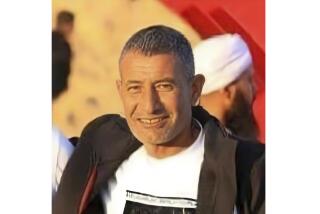Joy, angst over Israel prisoner swap
JERUSALEM â Images of the lanky soldier with dark eyes have haunted Israel for five years, but Gilad Shalit may finally be heading home.
Israel and the Palestinian militant group Hamas announced an agreement Tuesday to free Shalit, who was seized in 2006 in a cross-border raid near the Gaza Strip, in exchange for the release of more than 1,000 Palestinian prisoners.
The Israeli soldierâs capture pushed Israel to tighten a punishing blockade around the seaside enclave, where 1.5 million Palestinians continue to grapple with widespread poverty.
Shalitâs captivity has been a source of national anguish in Israel. In a country where most young people are required to serve in the army, nearly every household could identify with the Shalit familyâs pain.
But the case also triggered national soul-searching over whether to negotiate with Hamas, which Israel and the U.S. consider a terrorist group, and how high a price to pay for one soldierâs freedom.
The deal delivers significant gains to Hamas, an Islamist group that refuses to recognize Israel or renounce violence. The Palestinian prisoners to be released in the swap include some high-profile Palestinian leaders and many militants accused of killing Israelis in terrorist attacks.
Because of growing concern about Shalitâs safety, Israeli Prime Minister Benjamin Netanyahu, with help from Egyptian and German mediators, decided to accept a deal similar to one he rejected two years ago.
âIn the coming days, we will return Gilad to the bosom of his parents,â Netanyahu told reporters Tuesday, acknowledging that the decision required him to balance the 25-year-oldâs well-being with Israelâs national security interests.
âI do not know if the near future would have allowed us to achieve a better deal, or a deal at all, since it is very likely that this window of opportunity created in these circumstances would have finally closed, and we wouldnât have freed Gilad at all,â he said.
As word of the impending deal broke, cellphones throughout Israel seemed to ring simultaneously. In Tel Aviv, people huddled around televisions in cafes to follow the news.
Shalitâs ordeal, including a 2009 deal that collapsed at the last minute, has taken the nation on an emotional roller coaster. For years, many cars have sported yellow ribbons as a symbol of support for him.
The deal is likely to be a political boon for Hamas, particularly as it approaches elections next year.
Shalit and about 450 Palestinian prisoners are expected to be released in the coming week, with an additional 550 prisoners set free two months later, Hamas officials said.
Israeli officials said Marwan Barghouti, a popular Palestinian leader who was sentenced to five life terms for his role in organizing uprisings, will not be released. Even in prison, Barghouti has often ranked in polls as a leading contender for Palestinian Authority president, and he is seen as a figure who could unite Hamas and rival faction Fatah, led by Palestinian Authority President Mahmoud Abbas.
Barghouti was widely thought to have been listed among those to be freed in previous negotiations for Shalitâs freedom.
At a news conference in Damascus, the Syrian capital, Hamasâ political chief, Khaled Meshaal, praised the deal as a ânational Palestinian achievement.â
In Gaza, relatives and supporters of the Palestinian prisoners fired guns in the air and set off fireworks to celebrate what is believed to be the biggest prisoner swap in Palestinian history. Many revelers chanted slogans in support of the Izzidin al-Qassam Brigade, the group believed to have orchestrated Shalitâs capture.
âWe call on Palestinian armed groups to kidnap more Israeli soldiers in order to release the rest of our prisoners from Israeli jails,â said Gaza resident Alaa Moughrabi.
Not everyone in Israel celebrated the news. Several groups, including conservative political parties and relatives of victims of terrorist attacks, expressed concern about releasing criminals who might resume their attacks against Israel.
Polls had shown that Israelis were almost evenly divided between those who supported a deal to release Shalit at any cost and those who worried that the price would be too high and that negotiating with militants would only encourage more terrorist attacks.
--
Special correspondent Rushdi abu Alouf in Gaza City contributed to this report.
More to Read
Sign up for Essential California
The most important California stories and recommendations in your inbox every morning.
You may occasionally receive promotional content from the Los Angeles Times.










